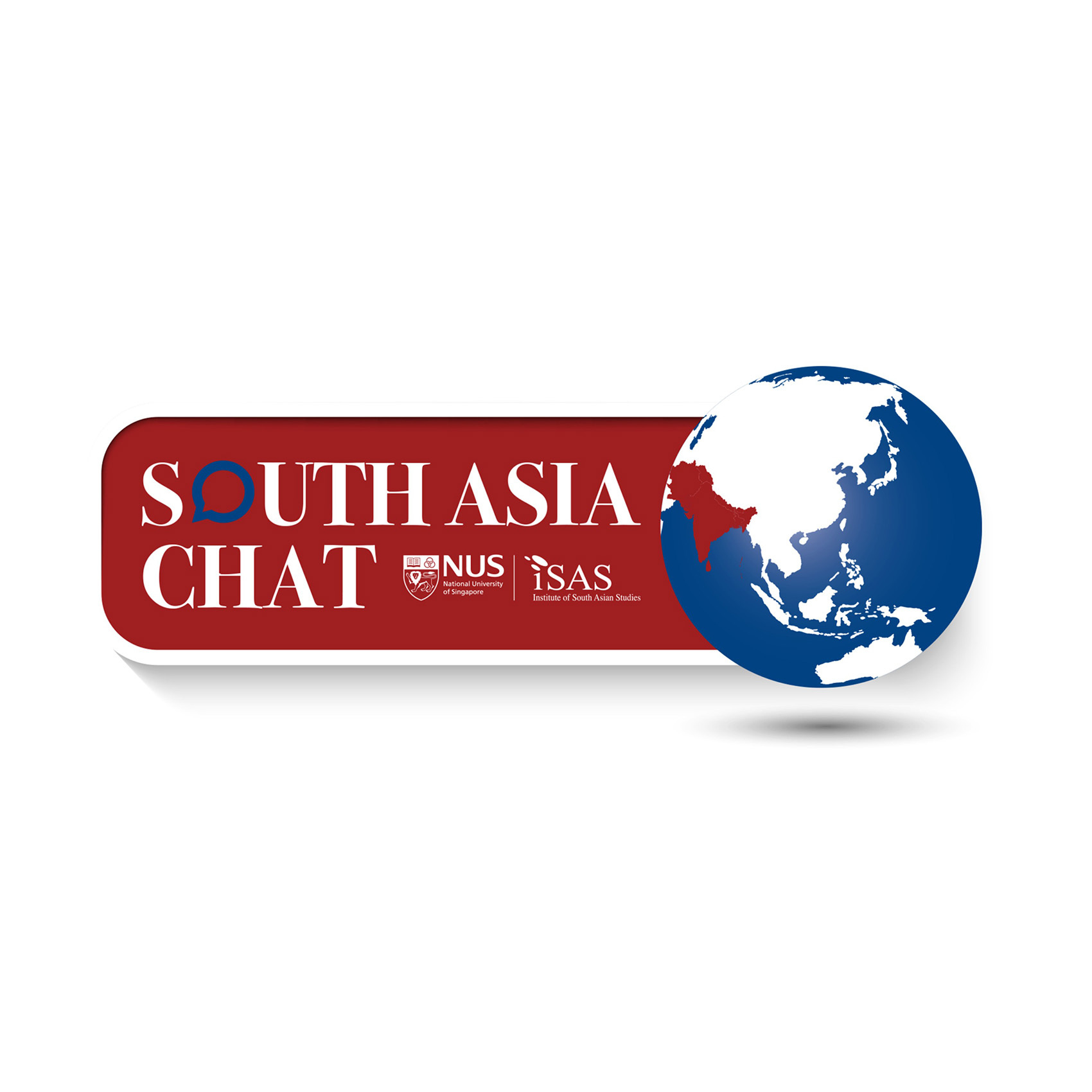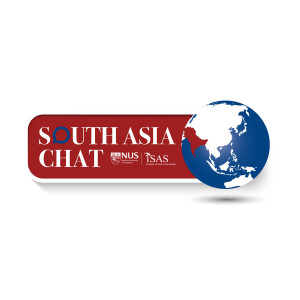
125.4K
Downloads
318
Episodes
South Asia Chat podcast series will feature conversations with analysts, academics and thought leaders on topical issues impacting South Asia.
South Asia Chat podcast series will feature conversations with analysts, academics and thought leaders on topical issues impacting South Asia.
Episodes

Wednesday Mar 03, 2021
Episode 77: India’s Divestment Programme
Wednesday Mar 03, 2021
Wednesday Mar 03, 2021
One of the biggest announcements made by the Finance Minister of India in the recent budget was the large divestment proposal that targets raising Rs 1.75 trillion (S$32 billion) to shore up the economy. The government plans to exit most of the sectors, except four strategic ones and the list of companies to be privatised include Air India, Life Insurance Corporation, IDBI Bank and some others. Dr Amitendu Palit, Senior Research Fellow; and Research Lead (Trade and Economics) at ISAS shares his views on the complexities of the disinvestment process and the possible challenges that this strategy could face.

Tuesday Feb 23, 2021
Episode 76: India's Pakistan Policy
Tuesday Feb 23, 2021
Tuesday Feb 23, 2021
The relations between India and Pakistan are consequential not just for South Asia but for the globe. The two countries have been engaged in three wars since 1947, with Kashmir and terrorism being at the centre of dispute. Dr Imran Ahmed, Consultant at ISAS, spoke to Dr Stuti Bhatnagar, Sessional Academic – University of New South Wales, Sydney, on India's Pakistan strategy. They also discussed her book titled India's Pakistan Policy: How Think Tanks Are Shaping Foreign Relations that examines the role of these institutes as foreign policy actors. Currently there are 509 operational think tanks in the country with many having considerable interest in India-Pakistan relations.

Tuesday Feb 16, 2021
Episode 75: Myanmar’s Military Coup - Implications
Tuesday Feb 16, 2021
Tuesday Feb 16, 2021
Myanmar’s State Counsellor Aung San Suu Kyi, President Win Myint and other leaders of the National League for Democracy were arrested in a series of raids by the military causing imbalance in the tensed civil-military relations on February 1. While, the American President Joe Biden slapped sanctions on Myanmar, India has taken a calibrated stand on the coup. To discuss this implications of this development on democracy, human rights and the larger geopolitical implications on South Asia, Nithya Subramanian, Editor at ISAS, spoke to our guest Dr Avinash Paliwal, a Senior Lecturer in International Relations and Deputy Director of the School of Oriental and African Studies, South Asia Institute.

Tuesday Feb 09, 2021
Episode 74: India's Vaccine Diplomacy
Tuesday Feb 09, 2021
Tuesday Feb 09, 2021
India has emerged as the largest producer of the COVID-19 vaccines globally with the locally manufactured Covishield and Covaxin. In January 2021, it began exporting Covishield to its neighbours and some countries beyond the region through its 'Vaccine Maitri' or 'Vaccine Friendship' initiative. It has, so far, committed to supply 10 million doses worldwide. In this episode, Dr Karthik Nachiappan, a Research Fellow at ISAS, shares his insights into India's vaccine diplomacy and its geopolitical implications against the background of a somewhat strained relationship with its neighbours and a growing Chinese presence in the South Asian region.

Tuesday Feb 02, 2021
Episode 73: Decoding The Farmers’ Protests
Tuesday Feb 02, 2021
Tuesday Feb 02, 2021
The Indian government passed three agricultural legislations last September, which led to protests by farmers mainly belonging to the states of Punjab and Haryana. After months of peaceful demonstrations, on 26 January 2021, the agitation turned violent, resulting in one protestor's death and injuring several policemen. What is also interesting is that the protests have received the support of Sikh groups living in Canada, the United Kingdom and Australia, thus garnering international attention. To share more insights into these recent developments and its political ramifications, we are joined by Mr Vinod Rai, a distinguished Visiting Research Fellow at ISAS and former Comptroller and Auditor General of India.

Tuesday Jan 26, 2021
Episode 72: President Biden and South Asia
Tuesday Jan 26, 2021
Tuesday Jan 26, 2021
On 20 January 2021, Joe Biden was sworn in as the 46th president of the United States of America, bringing to an end one of the most dramatic political transitions in the country’s history. In another historic moment, Kamala Harris became the first female, black, Indian-American vice-president. Since the Presidential election in November 2020, there is much interest in the future of Washington’s engagement with the subcontinent, which faces several opportunities and challenges. Amongst them, are China’s growing engagement with many South Asian countries, geopolitical contestation in the Himalayan belt and the peace process in Afghanistan, to name a few.
In this episode, our guest Ambassador Shivshankar Menon is in-conversation with Professor C Raja Mohan, Director of ISAS to discuss some of the key issues before the new Biden administration in relation to the subcontinent, including security and trade. Ambassador Menon is a Distinguished Visiting Research Fellow at ISAS, former National Security Advisor to the Prime Minister of India and a career diplomat.

Tuesday Jan 19, 2021
Episode 71: Bangladesh and Bhutan Trade - Way Forward
Tuesday Jan 19, 2021
Tuesday Jan 19, 2021
Bangladesh and Bhutan signed the first ever preferential trade agreement or PTA in December 2020 to boost bilateral trade. The agreement comes at a time when the two South Asian countries mark 50 years of diplomatic relations. Bhutan recognised Bangladesh’s independence on December 6, 1971, becoming the first country in the world to accept it as a sovereign nation. According to official figures, trade between Bangladesh and Bhutan was $12.77 million in the fiscal year 2008-09, which rose to $49.65 million in 2018-19. In this episode, Dr Mohammad Masudur Rahman, a Visiting Research Fellow at ISAS, shares his insights on the impact of this deal on bilateral trade between the two countries and what benefits they can reap.

Tuesday Jan 12, 2021
Episode 70: Prospects for South Asia in 2021
Tuesday Jan 12, 2021
Tuesday Jan 12, 2021
The Indian subcontinent is witnessing several structural changes caused by the on-going China-India clash along the border in eastern Ladakh, renewed civil military tensions in Pakistan, the US withdrawal from Afghanistan and the economic rise of Bangladesh. In the first episode of 2021, Professor S D Muni, an Emeritus Professor at the Jawaharlal Nehru University (JNU), New Delhi, discussed these broad prospects for South Asia with Professor C Raja Mohan.

Wednesday Dec 23, 2020
Episode 69: Rise of the Right Wing
Wednesday Dec 23, 2020
Wednesday Dec 23, 2020
In recent times, the role of religious political parties in Pakistan has grown significantly, with the Tehreek-e-Labbaik (TLP) being one of them. The party has been at the forefront of anti-France protests and opposed the amendments to blasphemy laws. However, it is now facing a leadership crisis after the untimely death of its charismatic leader Khadim Hussain Rizvi. To further discuss the TLP and its future, alongside the significant role religious political parties play domestically, we spoke to Visiting Research Associate Professor, Dr Iqbal Singh Sevea. He is also an Associate Professor of History at the University of North-Carolina-Chapel Hill with research focus on modern Islam and modern South Asia.

Tuesday Dec 15, 2020
Episode 68: Sri Lanka’s China Policy - A Continuation or a New Policy Direction?
Tuesday Dec 15, 2020
Tuesday Dec 15, 2020
With Sri Lanka’s insistence on a “neutral” foreign policy, questions are being raised over Colombo’s relationship with other global and regional powers like the United States, China and India. One of the common foreign policy challenges that the country faces is navigating big power relations. To discuss the strategies in detail, Dr Chulanee Attanayake, Visiting Research Fellow, was in-conversation with Dr Palitha Kohona, the new Sri Lankan Ambassador to China. Dr Kohona shared more insights into his plans on enhancing bilateral ties, geopolitics in Sri Lanka and the new President of the US, Joe Biden’s policy towards the country.
